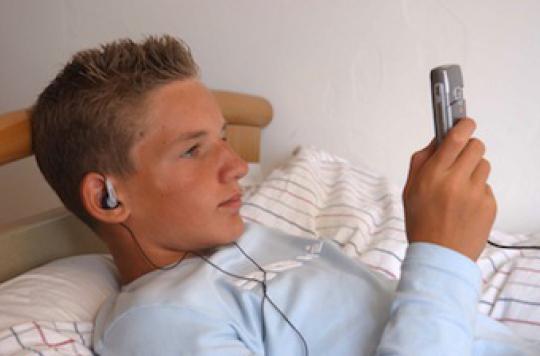In a study, researchers explain that the brightness of certain screens disturbs sleep. These scientists plead for the arrival of a “sleep mode”.

In less than ten years, the smartphone has invaded our daily lives. Nowadays, many of us even take it to bed and consult it several times just before sleeping. However, such a habit significantly affects the quality of sleep, as revealed by a British study published in the journal In Frontiers Public Health.
Blue light questioned
Paul Gringras, lead author and doctor at Evelina Children’s Hospital in London analyzed (with the help of a team of researchers from King’s College London and the University of Surrey) the effect of blue light emanating from three devices: the iPad Air, iPhone 5s and Kindle Paperwhite.
The results confirmed that the components of the screen strongly interfere with melatonin, a hormone naturally secreted by the human body at nightfall, and which promotes sleep. “Blue light is ideal during the day, but has catastrophic effects at night. Data shows that if you stay in front of the screen in the evening, or during the night, exposure to blue light can delay your sleep by an hour,” explains Dr. Gringras.
Faced with this problem, the specialist has a solution. He advises manufacturers to create a “sleep mode” on their devices, like the “airplane mode”, thus reducing the brightness of the screen. A function already present on some Android devices.

The “sleep mode” a solution?
Should smartphones be banned from the bedroom? If in view of these results, this seems to be the most appropriate solution, Dr Gringras nevertheless offers an alternative and suggests that manufacturers systematically create a “sleep mode”, on the model of “airplane mode” which would reduce the brightness of the ‘device.
Note that the Phillips brand and the Android operating system already use this type of application. On the other hand, Apple has not yet taken the plunge. In the meantime, iPhone and iPad users will have to turn off their phones if they want to preserve their sleep.
The authors of the study point out, however, that the quality of sleep is not conditioned by a single factor and that it is possible to improve it by changing bad habits and adopting a “healthy” lifestyle.
.














